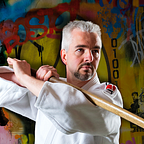Product Owner vs Product Manager
I know why you came here! this debate is raging the internet for quite some time now, and it keeps popping up. So, what is it? Product Owner or Product Manager?
TL;DR; “A Product Owner is a Product Manager with a Scrum Team” — Melissa Peri
Melissa summarised it best, but lets dive a little deeper in the origins of the debate and explore the root cause, what it means and how you should look at the Product Owner role.
The origin of Product Management
Product Management dates back to the 1930s and marks a gradual shift from project thinking to a process that centralises on a (set of) product(s) that deliver value for the company. A few decades later we see it crystallise in three more or less distinct competence areas, which many still teach:
There are some variants to the theme, but it boils down to:
- Strategic thinking; what aligns with the market, the brand, the company etc. The next big thing
- Tactical thinking; building the current generation of products and producing them
- Communicating; e.g. “selling” the product and making sure the customers know about it.
Since each operates in their own domain and there are little dependencies and changes involved it makes sense to create specific roles that focus on these areas. Mind you, this thinking has its roots in the industrial age, where the dominant model is to create large volumes of relative low customisation to a mass market. It gave birth to the pyramid organisational structure, (you know, that one you are probably still in) designed not only to seperate concerns but also to separate the do-ers from the thinkers.
“On the bottom of a pyramid you usually find mummies” — Just Meddens
Toyota started to change the game by introducing the just-in-time concept. It required fundamental changes on the level on how we make products, but a car was still a car and the timeline of running a version of a car model still numbered in years. So it had less affect on the marketing and strategic thinking. Then somewhere between 2000 and 2010 everything became software.
The world today
Customers expectations have shifted drastically, adoption times of new products have changed the time a company has to recuperate its investment from decades to days. And yet, many companies still use the principles that were designed a century ago. (Asymco has done some amazing research on that topic.)
The Product Owner role
When Scrum came along it tried to solve a part of the challenge that the new world brought by defining a simple framework that helps discovering faster what value is. It lays down the roles, artefacts and events that helps organisations to cut through this mist of complexity.
One of the key things it resolved was the latency of decision making. One of the reasons product development took so long is because product marketing, product planning and strategic product management were faced with more dependecies. Software wasn’t a car that you would throw away and replace, but something that evolved over time.
The simplest solution was to merge the concerns and create a single role that is responsible for the Product. Now they could have called the role Product Manager, but the fear was that little would change. Organisations would say: “we already have Product Managers” and go on their merry way.
The other reason is that Scrum doesn’t tell you how to do Product Management, it tells you how to solve complex problems while working with a team to continuously discover what value is.
So… a Product Owner is also a Product Manager?
Yes, which means you can’t do it without Product Management practices. It the end it is about getting a product or service in the hands of customer.
Product Management without Product Ownership
The other way around, you could, if you are in a domain where long product cycles are still common and legislation or other factors favor planning over learning, but it’s getting harder to find examples where that is true. The truth is software has eaten the world and building valuable products has become really complex.
What it means
I believe that it is the wrong question. It is not about if you apply Scrum, it is about if you apply it well.
“Every samurai has a sword, but not everyone with a sword is a samurai” — The Product Samurai
A Product Manager with a Scrum Team has the tools to be extremly effective in the complex world of developing products, the question is: do you wield it better than your opponent.
